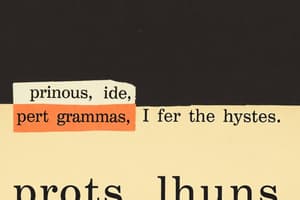Podcast
Questions and Answers
Which of the following pronouns appears after the verb?
Which of the following pronouns appears after the verb?
- me (correct)
- myself
- I
- my
What form of the verb 'to be' is used with the subject 'they' in the present tense?
What form of the verb 'to be' is used with the subject 'they' in the present tense?
- is
- are (correct)
- does
- am
Which of the following is an example of a possessive pronoun that appears without a noun alongside it?
Which of the following is an example of a possessive pronoun that appears without a noun alongside it?
- his
- mine (correct)
- its
- my
What is the correct form of the verb in the present continuous tense for the subject 'I'?
What is the correct form of the verb in the present continuous tense for the subject 'I'?
Which of the following is an example of a reflexive pronoun?
Which of the following is an example of a reflexive pronoun?
What auxiliary verb is used in the present perfect tense for the subject 'they'?
What auxiliary verb is used in the present perfect tense for the subject 'they'?
Which of the following is an example of a subject pronoun?
Which of the following is an example of a subject pronoun?
What form of the verb is used in the future continuous tense?
What form of the verb is used in the future continuous tense?
When comparing two things, what is used to form the comparative?
When comparing two things, what is used to form the comparative?
What is the correct form of the verb in the past perfect continuous tense?
What is the correct form of the verb in the past perfect continuous tense?
Flashcards are hidden until you start studying
Study Notes
Types of Pronouns
- Subject Pronouns: appear before the verb, examples: I, you, he, she, it, we, they
- Object Pronouns: appear after the verb, examples: me, you, him, her, it, we, them
- Possessive Pronouns: present ownership, examples: my, your, his, her, its, our, their (appear with a noun) and mine, yours, his, hers, its, ours, theirs (appear without a noun)
- Reflexive Pronouns: refer back to a person, examples: myself, yourself, himself, herself, itself, ourselves, themselves, yourselves
Verb Tenses
- Present Tense: uses "to be" (is, are, am) and auxiliary verbs (do, does)
- Present Continuous: uses "is", "are", "am" + "ing" in the verb
- Present Perfect: uses "has" (he, she, it) and "have" (I, you, we, they) + participle
- Past Perfect: uses "had" + participle
- Past Perfect Continuous: uses "had" + "been" + "ing" in the verb
- Future Continuous: uses "will" or "shall" + "be" + "ing" in the verb
- Future Perfect: uses "will" + "have" + participle
Comparative and Superlative Forms
- Comparative: use "er" or "more" for words with 2 syllables, and "than" for comparisons
- Superlative: use "est" or "most" for words with 3 syllables or more
Studying That Suits You
Use AI to generate personalized quizzes and flashcards to suit your learning preferences.




